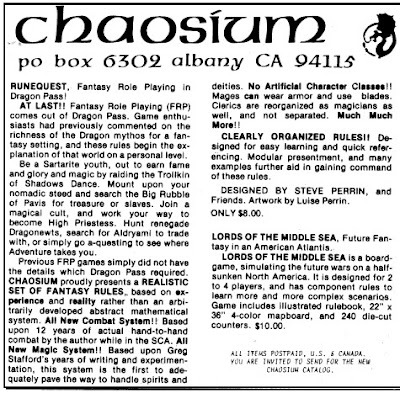The Enduring Appeal of Character Classes
 The other day I was looking into a roleplaying game to which I'd recently seen references and was surprised to discover that, despite its having been published in 2022 and not being a fantasy game, it nevertheless made use of character classes. Of course, character classes, like hit points and experience points, to cite just two examples, are well-established elements of RPG design, owing to their having appeared in Dungeons & Dragons at the dawn of the hobby. That even a game published almost a half-century after OD&D makes use of them thus shouldn't be the least bit shocking.
The other day I was looking into a roleplaying game to which I'd recently seen references and was surprised to discover that, despite its having been published in 2022 and not being a fantasy game, it nevertheless made use of character classes. Of course, character classes, like hit points and experience points, to cite just two examples, are well-established elements of RPG design, owing to their having appeared in Dungeons & Dragons at the dawn of the hobby. That even a game published almost a half-century after OD&D makes use of them thus shouldn't be the least bit shocking.
The reason that I was surprised is that, for as long as I've been involved in the hobby, there have been loud complaints about character classes and their supposed deficiencies. One of the commoner complaints is that classes are too "restrictive" in some fashion. Others argue that the classes are "arbitrary" or even "unrealistic" in the way they categorize the skills and abilities of different adventuring professions/vocations. Still others say that classes are "simplistic," a relic of an earlier phase of game design before more "sophisticated" approaches had been imagined. Like training wheels on a bicycle, the hobby should abandon character classes now that it finally understands how to build a better game.
Seeing a new RPG make use of characters would seem to run counter to these long-stated complaints, not all of which are without some merit. Indeed, I have at various times been sympathetic to many of them, particularly those that focus on the limiting nature of character classes. Why shouldn't a fighter be able to learn how to pick locks or climb walls? Why shouldn't a magic-user be able to pick up a sword and fight? This is the line of thought advanced by Chaosium in its early advertisements for RuneQuest, which decried character classes as "artificial" and, on that basis, ought to be rejected in favor of "a realistic set of fantasy rules based on experience and reality rather than an arbitrarily developed abstract mathematical system."
 Truth be told, I understand Chaosium's perspective well, especially of late, as my appreciation for the elegance of the design of Basic Role-Playing has increased. As I continue to (slowly) chip away at my Secrets of sha-Arthan setting, I'm seriously considering the abandonment of character classes altogether, opting instead for something much looser and closer to BRP's skill-focused design, since it more closely approximates the kind of weird science fantasy that inspired sha-Arthan in the first place.
Truth be told, I understand Chaosium's perspective well, especially of late, as my appreciation for the elegance of the design of Basic Role-Playing has increased. As I continue to (slowly) chip away at my Secrets of sha-Arthan setting, I'm seriously considering the abandonment of character classes altogether, opting instead for something much looser and closer to BRP's skill-focused design, since it more closely approximates the kind of weird science fantasy that inspired sha-Arthan in the first place.Yet, there can be no denying that character classes, whatever their putative flaws, have stood the test of time. The very simplicity that critics decry is, in fact, one of their virtues. Classes are quite helpful for newcomers, since they narrow the range of choices during character generation to a flavorful handful of easy-to-understand archetypes. In a similar way, their artificial restrictions and limitations help to ensure that every character has a delineated mechanical role. This, too, is important to newcomers, who can sometimes be overwhelmed by the freedom inherent in roleplaying games, where there is no obvious "right" answer to the referee's perennial question of "What would you like to do now?"
Now, to those who've played RPGs for years, particularly those suffering from D&D fatigue, character classes may well seem like a played out concept that's no longer fit for purpose, one that's been superseded by a number of alternative ways to build a player character. I wouldn't dare to deny this, though I would point out that, except for a handful of exceptions – GURPS being one of those with which I have great familiarity – most roleplaying games include some sort of mechanical frame around which a player builds his character, whether it's the prior services of Traveller, the occupations of Call of Cthulhu, or even the clans/tribes/traditions/etc. of White Wolf's World of Darkness games. Some of these alternate approaches are a little more flexible than D&D's character classes certainly, but are they wholly different? (It's worth noting, too, that, like many other elements laid down by D&D, many video games make use of character classes and do so for the very reasons I've outlined here.)
In the final analysis, I think it's fair to say that character classes work. They might not "make sense" according to some lines of thoughts, but they serve the purpose for which they designed, namely to make it relatively easy to generate a character and to give that character a ready-made niche within the play of the game. That's not nothing. Indeed, it's a genuinely clever bit of design that I don't think gets as much praise as it deserves.
James Maliszewski's Blog
- James Maliszewski's profile
- 3 followers



